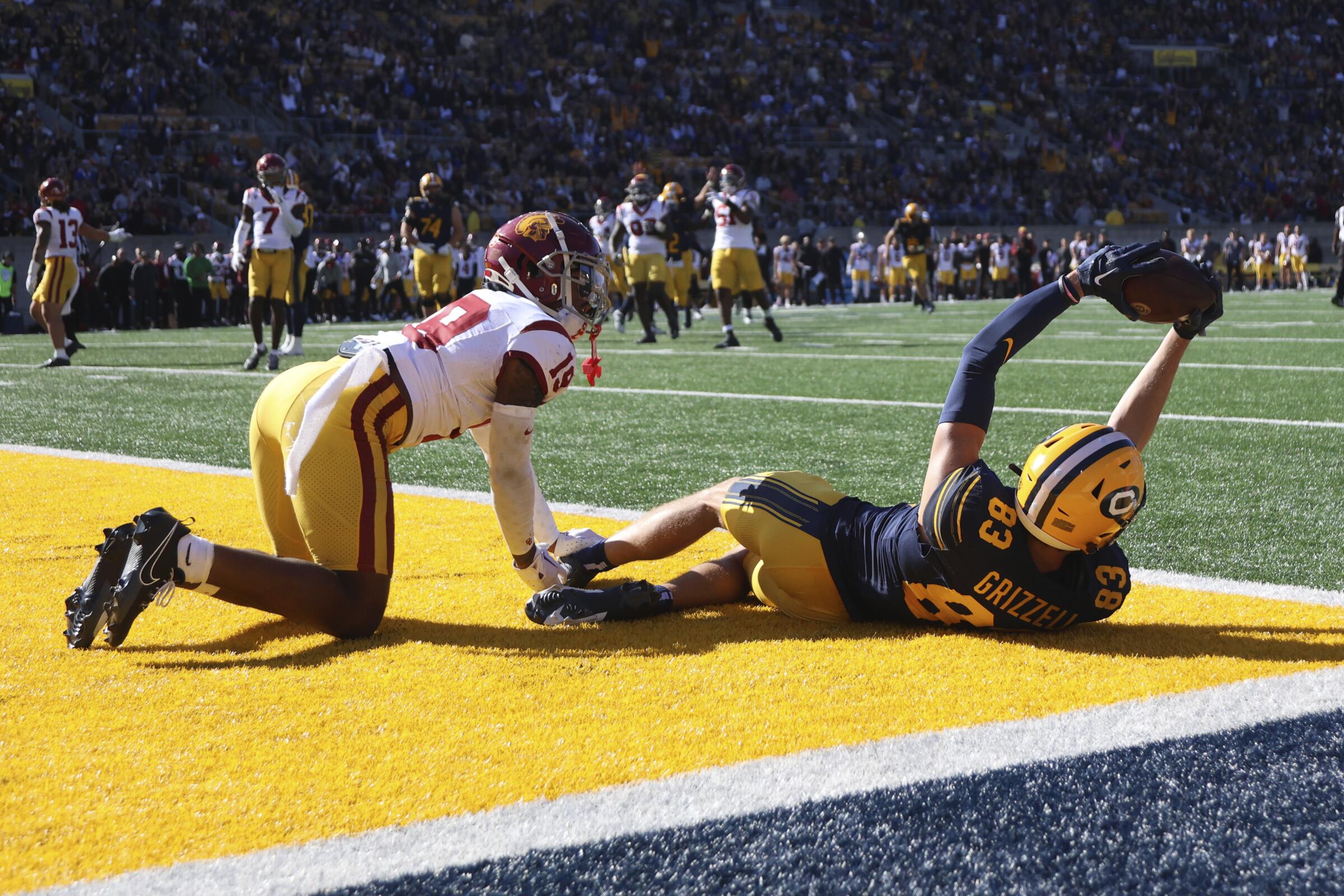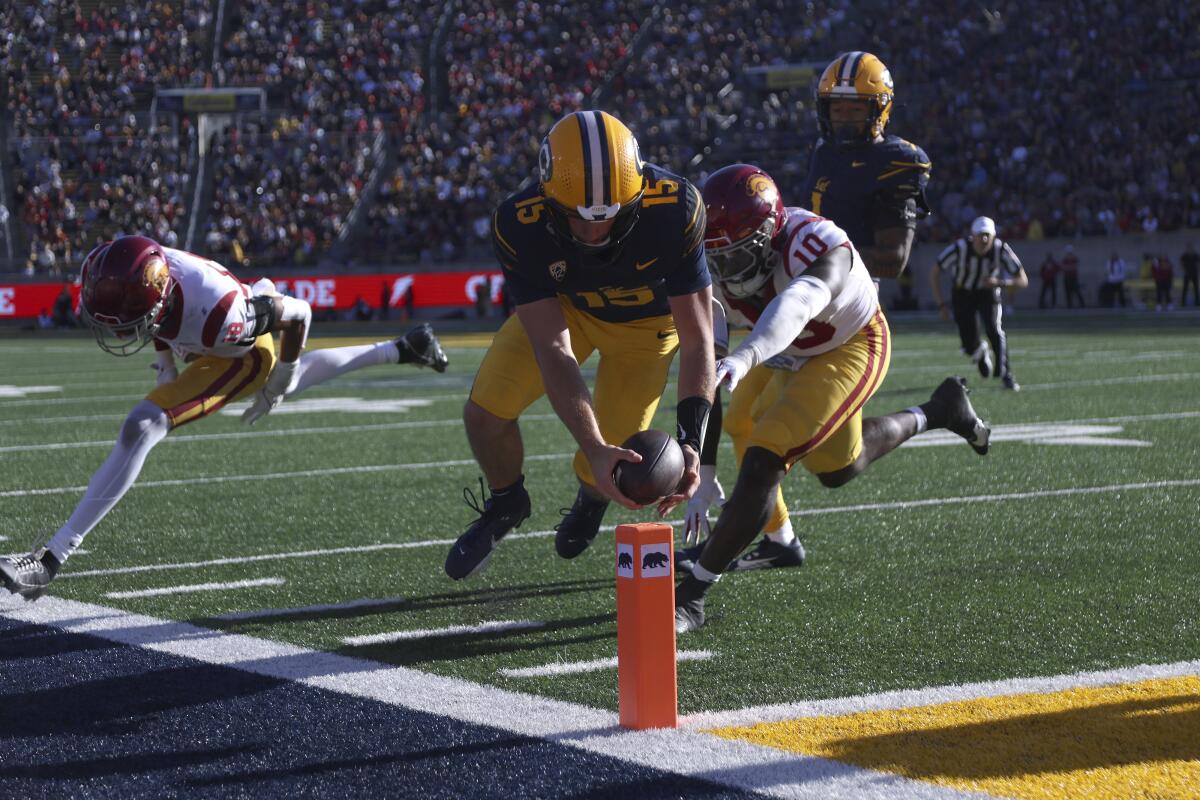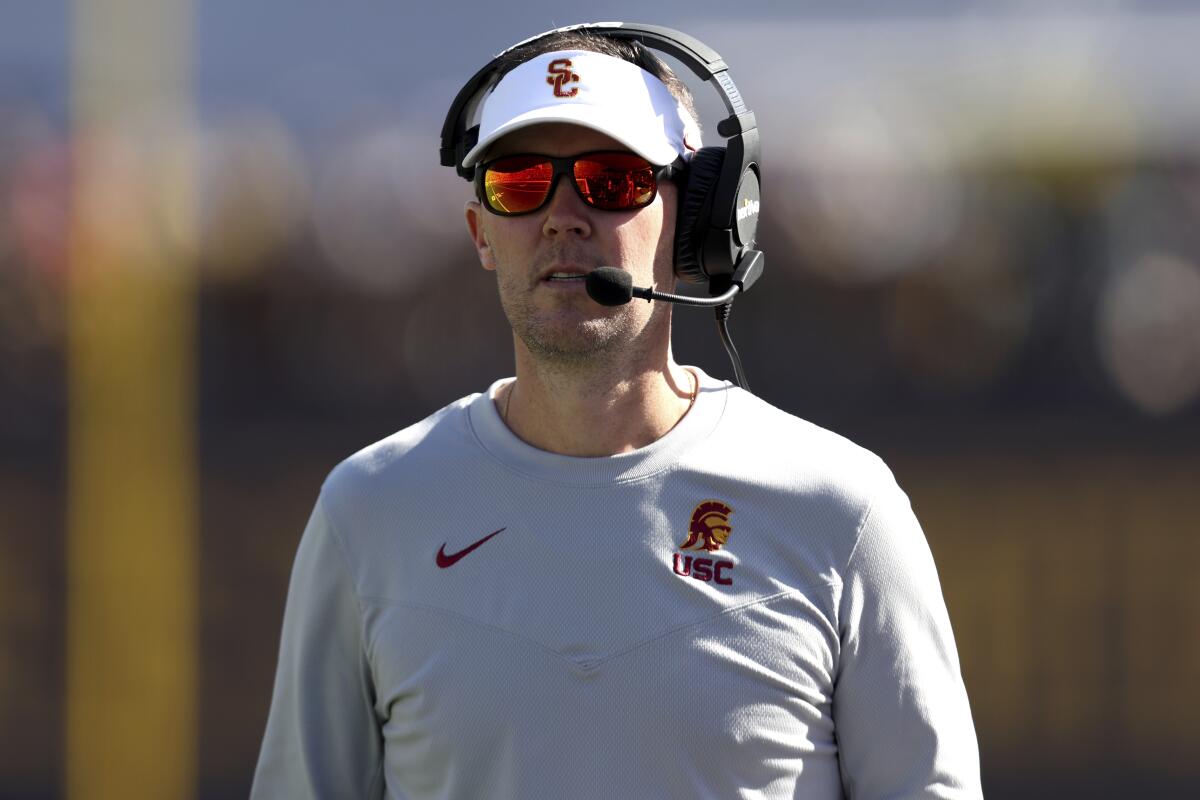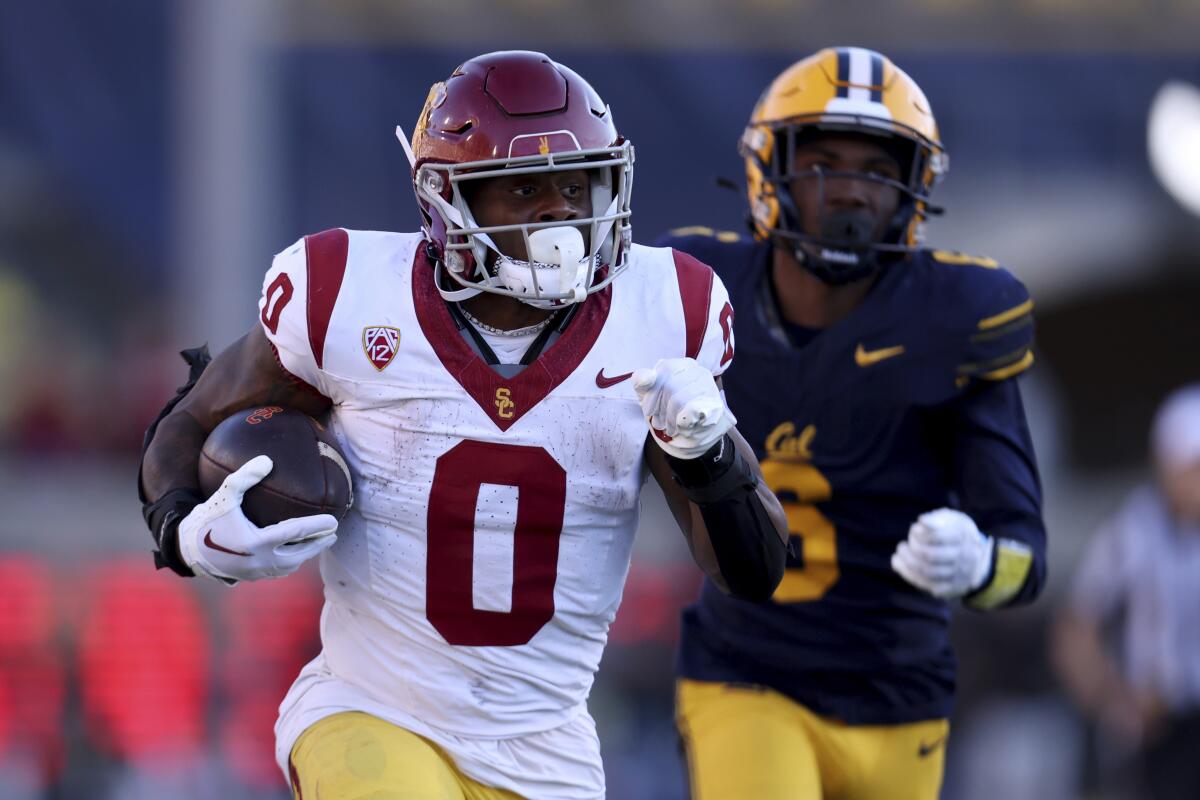Go beyond the scoreboard
Get the latest on L.A.'s teams in the daily Sports Report newsletter.
You may occasionally receive promotional content from the Los Angeles Times.

Alex Grinch shook his head as Pac-12 Network cameras zoomed in on his disbelief. It had been a long afternoon already. USC‘s defense was backed up against its own goal line, in desperate need of a stand, when a yellow flag suddenly went flying. USC players claimed there was a false start, but the refs saw otherwise. A penalty was called on the Trojans.
“Disconcerting signals,” the ref declared. California scored on the next play.
It was an unusual call, but a painfully fitting descriptor. When it came to USC’s defense, the last month had offered up one deeply disconcerting signal after another. The bad tackling in Tempe. A fourth-quarter collapse in Colorado. A breakout for Utah’s backup passer. In Berkeley, it was Jadyn Ott, Cal’s star running back, bursting untouched through one big hole, then another, racking up rushing yards at will while USC seemed helpless to stop him.
Safety Jaylin Smith broke up a two-point conversion attempt with 58 seconds left, and No. 24 USC rallied late to defeat California 50-49 on Saturday.
The Trojans still managed to escape Berkeley unscathed, high-tailing it out of the Bay with a 50-49 victory in hand. Their defense forced four turnovers and got critical stops when desperately needed. But the signals USC sent once again about the direction of its defense were too disconcerting to be brushed away with a win.
For the third time in five weeks, USC gave up more than 500 yards. USC had given up that many yards that many times in that short of a span only once before: last year, under Grinch.
The 6.9 yards per play USC gave up were a season high. Its pass rush, which looked strong not that long ago, couldn’t manage a sack. Ott finished with 153 yards after barely playing the second half after sustaining an injury.
And this all came against Cal? A team down to its third quarterback of the season? That’s the second backup in two weeks who conjured up a career-best game against USC.
Consider then what awaits the Trojans next on their schedule: two of the top-10 offenses in the nation, each with Heisman Trophy candidates at quarterback.
How Grinch’s defense fares during the most difficult stretch of USC’s schedule likely will determine his fate. Coach Lincoln Riley was asked Saturday if he thought any changes on defense, including to the staff, might be necessary ahead of that stretch.

“I’m trying to beat Washington next week,” Riley said. “That’s my job, to get this team ready, sitting 5-1 in the best conference in America, to try and go win it. … Are there some things defensively that have to get better for us to do it? Yeah. There’s some things offensively that have to get better. There’s some things on special teams that have to get better. That’s the ebbs and flows of this season.”
The pitchforks are sure to be sharpened in the coming days, as frustrated fans call more fervently for Grinch’s firing. But it should be noted that USC’s defense did look better at times during the second half Saturday. Ott was mostly a nonfactor after the first quarter, while the Trojans forced the Bears into either a turnover or three-and-out on six of their 10 second-half drives.
“We just got to continue to trust in each other, trust ourselves and trust what we worked on all week,” linebacker Jamil Muhammad said. “We made plays when we needed to.”
But when Cal got the ball with a little more than three minutes remaining, the Bears had no issue making plays when they needed to, marching down the field on a nine-play, 79-yard touchdown drive. If not for a failed two-point conversion, the conversation Saturday night about USC’s defense could have been a lot different.
Still, the signs were there. If you were looking.

When Gentry made eye contact with the Cal tight end, he knew. The two-point conversion was coming his way.
The realization came at a critical moment. Cal had just scored with 58 seconds remaining, making it 50-49. An extra point would tie it, but the Bears were going for the win. So Gentry followed closely, pasted to his target, as Cal tried to force the two-point pass. Safety Jayden Smith was in equally strong position and knocked the pass thrown toward the receiver he was covering near Gentry. Cal’s attempt failed.
“We worked on that,” Gentry said of the play.
For USC, it was the first time in a while that a two-point conversion attempt went its way. Before Gentry and the defense made that final stop, the offense botched two of its own two-point attempts. That’s after twice failing on two-point tries the previous week during its loss to Utah.
After the loss of mentors Dave Nichol and Mike Leach, USC coach Lincoln Riley has mulled early retirement and noted NFL coaches have better schedules.
Down 28-23, USC opted for a two-point conversion attempt early in the third quarter to cut its deficit to a field goal. When that failed, it was all set to attempt another on its next touchdown, to take a 31-28 lead. But a holding penalty on Mason Murphy led Riley to change his mind. He sent kicker Denis Lynch out for an extra point, only for Lynch to shank the attempt.
Those two points would’ve been nice during the final, tense minutes.

After MarShawn Lloyd fumbled last week during USC’s loss to Utah, Riley acknowledged he got gun shy with the ground game. The coach called just three more designed runs the rest of the second half, all three of which went to Austin Jones, and as a result, the offense lost its balance. He would do better, he said later, to stick with the run.
So when Lloyd started slowly Saturday, Riley followed through on his promise. He kept feeding him. Late in the fourth quarter, Lloyd had 16 carries, but for only 59 yards. Still, Riley didn’t shy away, hoping USC eventually would break through.
The game was tied at 43 late in the fourth quarter when Lloyd finally found daylight. He went 56 yards before he was brought down. One play later, Jones punched in the decisive score.
It wouldn’t go down as one of USC’s more efficient efforts on the ground. The Trojans’ 3.2 yards per rush weren’t exactly effective, while their 128 rushing yards were well below their season average.
But a more patient approach paid dividends. Lloyd’s big run was the big difference down the stretch Saturday.
“Be ready whenever my name is called, you know,” Lloyd said. “You gotta be able to block out the noise and just go on. What’s next? That’s the mentality that we gotta be on.”
Go beyond the scoreboard
Get the latest on L.A.'s teams in the daily Sports Report newsletter.
You may occasionally receive promotional content from the Los Angeles Times.